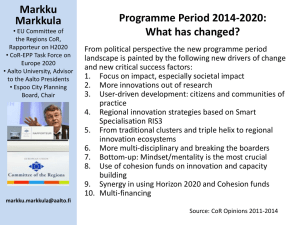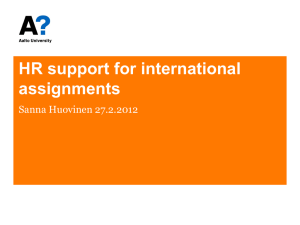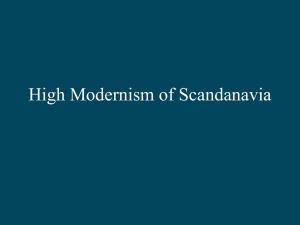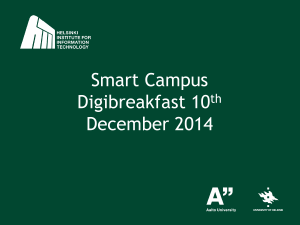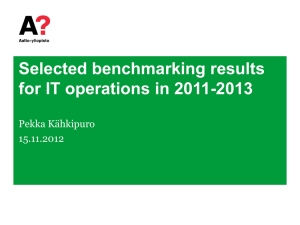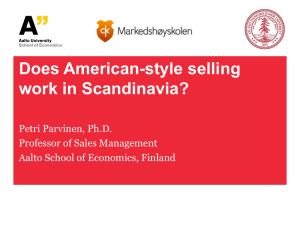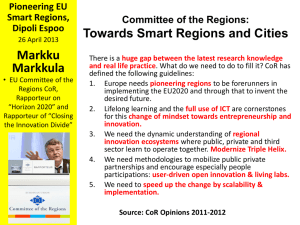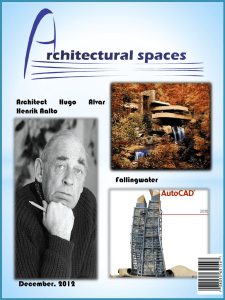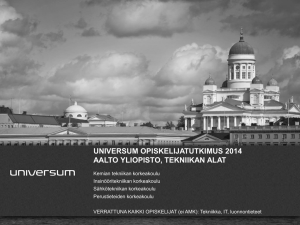Grand Challenges challenging universities of technology to
advertisement
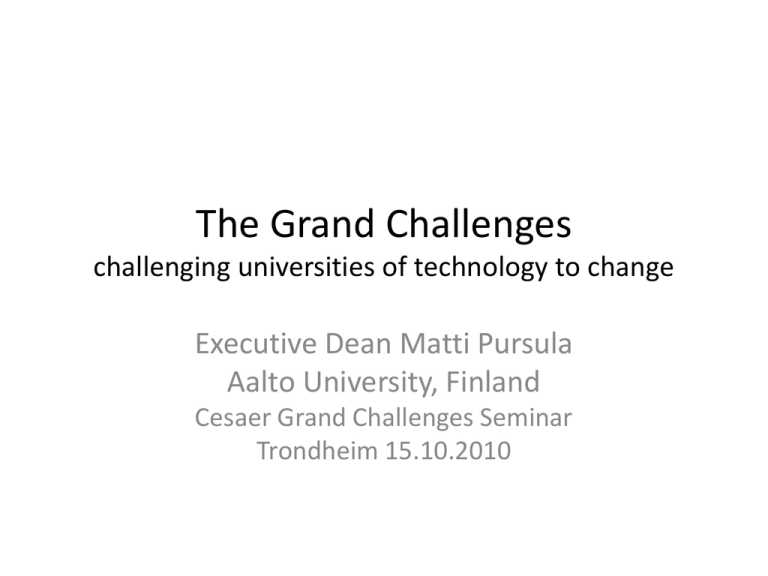
The Grand Challenges challenging universities of technology to change Executive Dean Matti Pursula Aalto University, Finland Cesaer Grand Challenges Seminar Trondheim 15.10.2010 Introduction Europe must focus on the Grand Challenges of our time • The Grand Challenges defined by the Lund Declaration in 2009 – Global warming – Tightening supplies of energy, water and food – Ageing societes – Public health – Pandemies and – Security Meeting the Grand Challenges The Lund Declaration • Strengthening frontier research initiated by the research community itself – Competition among researchers to ensure the quality • Taking global lead in the developing of enabling technologies – Biotechnology, information technology, materials and nanotechnologies • Bringing together supply side and demand side measures to support both business development and public policy goals – New knowledge for industrial, environmental and social policies, agriculture and regional development • Excellence and well-networked knowledge institutions – Modernisation of and cooperation between universities • The creation and maintenance of world class research infrastructures • A risk-tolerant and trust-based approach in research funding The role of engineering universities • Science and engineering have traditionally been seen to have the key position in solving the Grand Challenges, but – To meet the Challenges we need an approach is needed where public and private organisations work together to make the knowledge triangle to work (”Knowledge Triangle Shaping the Future Europe”, Gothenburg 31.8 2.9.2009) – It is important to realise that the challenges are also societal in nature, i.e. they are also related to human behavior and search for better life • Therefore, a wide approach in engineering universities is needed, including cooperation with public and private organisations and other disciplines like social sciences, economics, design, etc. The need to change in universities • The societal pressure – The global challenges • The grand challenges of mankind • The challenge of global competition in the knowledge based economy • The internal pressure – The challenges of university leadership and management • Scarce resources and rising costs of labour and infrastructure • The needs of multi-disciplinarity and inter-disciplinarity • The challenge of international competition The societal pressure • According to the Lund declaration the universities have to reassess – their missions, management and structures – their approaches to education and facilitating learning – their pursuit of research – their involvement in innovation activities and regional and national development The Finnish approach • Knowledge and innovations high on the political agenda • University reform to give universities more autonomy • Several policy actions to promote innovations and cooperation between universities, companies and public organisations Co-operation between companies and universities and research institutes Share of innovative companies having co-operation agreements with universities (1994-1996) Share of innovative companies having co-operation agreements with public research institutes (1994-1996) Norway Norway UK UK Sweden Sweden FINLAND FINLAND Portugal Portugal Austria Austria Netherlands Netherlands Irelands Irelands Italy Italy France France Denmark Denmark Germany Germany Belgium Belgium EU EU 0 20 40 60 % Source: Eurostat, Enterprise DG, 2nd Community Innovation Survey, Veijo Ilmavirta, OIIC 0 20 40 60 % Aalto university: An example of change Aalto University: An example of change A merger of three leading Finnish universities operative 1.1.2010 Art & Design founded 1871 Science & Technology, founded 1849 Economics, founded 1911 • Aalto University The second biggest university in Finland • 4,300 faculty and staff, including 300 professors (200 in technology) • 20,000 students (13 000 in technology) • 75,000 alumni Total annual budget 400 million € (2010) GOAL 2020 A world class university combining science and art, technology, business and industrial design to stimulate innovations 11 Aalto University: Reassessing the Mission Aalto University will strive to change the world through • top class interdiscilpinary research, • pioneering education, • continuous renewal, and • bold surpassing of traditional boundaries We will educate responsible and broad-minded experts with wide perspective to act as future visionaries in the society 12 Aalto University Reassessing the management and structures 1 • Governance system – Aalto University is a foundation • Capital of 700 million euro is given by the State (500 million) and the private industries and private persons (200 million) • Increased yearly funding for 10 years to give a good start – Strategic Board • Seven members coming from outside the university • The board nominates the President, Vice Presidents, Deans and Directors of service functions • Board decides the yearly budget and strategic guidelines – The board is nominated by the University’s Committee on Academic Affairs Aalto University Foundation: The founding partners The Government of Finland Federation of Finnish Technology Industries Technology Industries of Finland Centennial Foundation Foundation for Economic Education Confederation of Finnish Industry and Employers Finnish Association of Graduate Engineers Finnish Association of Business School Graduates 14 Aalto University Reassessing the management and structures 2 • School model (autonomous in academic affairs) • For the time being three schools (Economics, Design and Science and technology) • From the 1st of January 2011 six schools (Economics, Design and four schools in Science and technology) • All central functions under academic leaders (President and four Vice-Presidents) • • • • Research and education (2 VPs) Networking (1 VP) Library and infrastructure (1 VP) Joint services (Finance, HR, PR, Planning and Fundraising) have professional directors under the President Organization School of Economics School of Art and Design School of Science and Technology Research and Education Knowledge Networks Infrastructure Services Academic Affairs Committee Academic Affairs Committee Academic Affairs Committee Executive Dean Executive Dean Executive Dean Tenured Professors Council Academic Affairs Committee President Board Aalto University: Reassessing the approach to education and facilitating learning • The goal is to create a new type of learning and student centered academic culture in research and education – Better commitment of students and personnel – Learning outcomes based approach – Strengthening the Bologna model – New approaches to teaching (Design Factory) – Increased involvement of students to research Aalto Factories Multidisciplinary Opportunities Expertise workshops and the first new platforms for collaboration within Aalto University • • • Design factory Media Factory Service Factory The factories are environments for learning, teaching, research and co-creation between universities, companies and society. Aalto-Tongji Design Factory ATDF • Joint project between Aalto University and Tongji University • 1000 m2 of creative, transformable space bringing together students, research, industry & society • Passion-based co-creation platform for interdisciplinary collaboration • ATDF was opened 25.05.2010 Aalto on Tracks An example of student enthusiasm - Aalto on Tracks took 83 Aalto students (and a few members of staff) from Helsinki to Shanghai by train 14.5. - 24.5. - Aalto on Tracks was a joint project of the Aalto-community : Aalto University, Aalto University Student Union, Aalto Design Factory in Shanghai ja Aalto Entrepreneurship Society - The project was planned and realized by student volunteers - The aim of the project was to make Aalto University, Finland and Finnish education known to the World, and to offer the participants cross-disciplinary learning experiences Aalto University: Reassessing the pursuit of research • An international Research Assesment Exercise (RAE) was done in all schools in 2009 as a starting point for development • Research strategy focuses on current strenghts and areas seen important to the university and society • The university supports excellence and ambition • A tenure track system is created as a central strategic tool in the creation of focus in research and education • Creating strategic partnerships with universities and industry on a global scale • Internationalisation of the staff and student population Average Ratings of Aalto RAE On average, research at the Units of Assessment was judged to belong between good and very good international level (scale 1-5): Average (All Units) Research Quality Scientific Impact Societal Impact Research Environment Future Potential 3.57 3.11 3.87 3.13 3.70 Basic trends: • The impact on and the visibility within the international scientific community is not as strong as the quality of research would deserve • The societal impact of research is very good (4 or more) in most departments • These trends are more visible if we look at the distribution of numerical ratings Aalto University: Reassessing the involvement in innovation activities • Reorganisation the innovation activities and research support services of the former three universities • Spontaneous self-organisation of students to Aalto Entrepreneurship Society with already more than 3000 members – Aalto Garage for start-ups – Boot Camps for students planning to start an entreprise of their own AALTO CENTRE FOR ENTREPRENEURSHIP (ACE) Main Targets • Higher awareness of entrepreneurship • Willingness to establish a company Entrepreneurship • Understanding of Education the market dynamics Main Targets • World-Class commercialization models • World-class commercialization results • Outside-In flow of capital and talent Innovation Services And Technology Transfer Entrepreneurship Research Growth Venturing / Start-Up Services Main Targets • World-Class entrepreneurship research in selected areas • Special focus on high-growth ventures Main Targets • World-Class venturing models • World-class venturing results • Outside-In flow of capital and talent “Community-driven growth entrepreneurship catalyst at Aalto University.” Foster an entrepreneurial culture at Aalto University Make resources available for Aalto startups http://www.aaltoes.com/ Grow Entrepreneurial Leaders http://facebook.aaltoes.com/ 23.3.2010 Aalto University: Reassessing the involvement in national and regional development • Active cooperation of the former three universities with regional and national organisations continues • Cooperation agreements with the cities in Helsinki region • Active partner in forming the Metropolitan development strategy • A shareholder in local and regional development companies Espoo City strategy – “T3” Otaniemi campus Inspired by the idea of Aalto University Otaniemi campus Keilaniemi business hub University as a Value Co-creation Platform • The goal of the T3 -project is to connect and facilitate interaction between the university, corporate research and living / commercial centers of Espoo. • Aalto University is the value cocreation platform in city scale, facilitating the discussions and development through research and education, enabling new areal learning process to take place. Summary • The Grand Challenges of mankind ask for new approaches in university education and research • Renewal of governance, management, teaching and research are needed • Local and international networking and cooperation are essential both in research and education and in the fullfilment of the third mission • There are different ways to make the change based on the cultural and institutional framework
